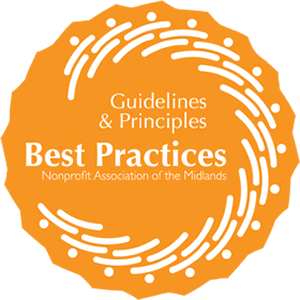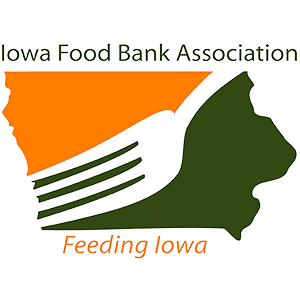Advocacy
Be a catalyst for change. Become a voice for people in need and an advocate for our efforts.
Food insecurity is an extremely important issue—around the world, across the country, and right here in Nebraska and western Iowa. Help us advocate to end hunger. Whether you reach out to legislators, or work to educate your friends and family about food insecurity in our communities, every conversation is another vital step toward achieving our mission and ending hunger in the Heartland.
september is hunger action month
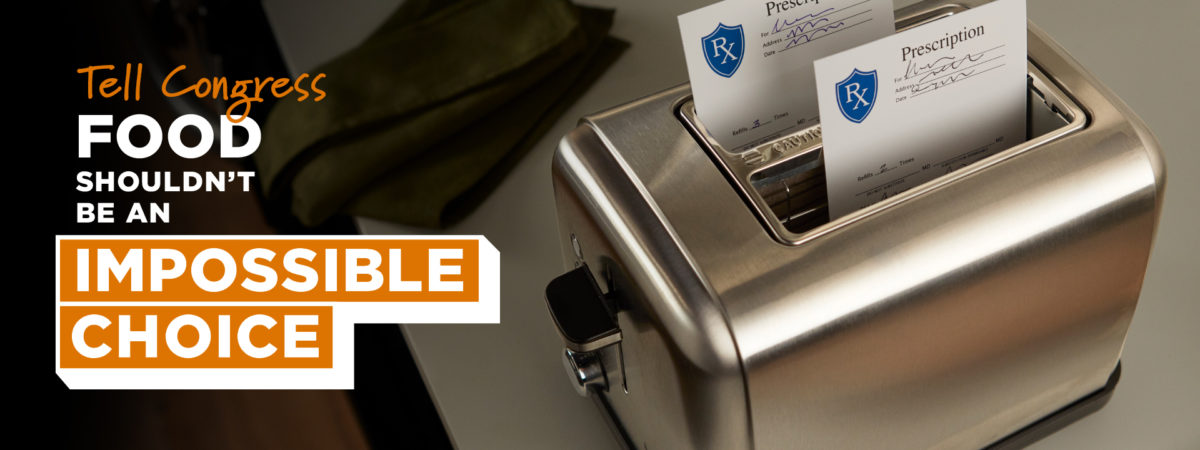
How you can make your voice heard:
Advocacy alert: You can help reduce child hunger!
Tell Congress to pass the expanded Child Tax Credit now.
The bipartisan Child Tax Credit proposal (H.R. 7024) would strengthen a powerful and proven tool to help ensure families can access the food and resources they need to thrive—and offset the rising costs that our neighbors across Nebraska and western Iowa are facing.
The Child Tax Credit bill passed the House and the focus on this issue now moves to the Senate.
The current bipartisan proposal would help provide food to 16 million U.S. children in households with low income, and lift hundreds of thousands of children and their families above the poverty line.
Child Tax Credit resources
- Click here to find and contact your Senators
- Feeding America Legislative Summary
- Feeding America Bill Summary
- H.R. 7024 Full Bill Language
- Analysis from the Center on Budget and Policy Priorities
- Feeding America Press Statement
Contact your Senators today and request their support for the Child Tax Credit.
Farm Bill
The Farm Bill is the centerpiece federal legislation for food and farming, and it impacts access to nutritious food for the millions of people in America struggling with hunger—including our neighbors across Nebraska and western Iowa. It provides an opportunity for policymakers to comprehensively and periodically address agricultural and food issues. The Farm Bill typically is renewed about every five years—and work is currently underway in the House and Senate for changes to important programs impacting neighbors in the Heartland.
In November 2023, a Continuing Resolution was passed to temporarily fund the federal government as both Houses work on appropriations legislation.
The Farm Bill and the nutrition programs it contains will factor into the debate. It is important that members of your delegation continue to hear from you on strengthening support for nutrition programs including the Supplemental Nutrition Assistance Program (SNAP), The Emergency Food Assistance Program (TEFAP) and the Commodity Supplemental Food Program (CSFP).
The RESTORE Act
Another important aspect of the Farm Bill is The RESTORE Act, which would repeal the federal ban on individuals with felony drug convictions from receiving SNAP. Access to food is foundational to a person’s ability to thrive, especially while re-entering society after serving their sentence. That’s why we support repealing this SNAP ban at at the federal level.
We encourage you to watch this video from our friends at Heart Ministry Center featuring Nebraskans sharing the harmful impact that the SNAP ban has had on their lives. Comment, like, and share this video—or tag your state senator or member of Congress to make sure they hear about this important issue!
Farmers Feeding America Act
We join our friends at Feeding America in asking Congress to double funding for annual TEFAP food purchases to $500 million per year, double funding for TEFAP storage and distribution to $200 million per year and ensure that SNAP is strengthened, protected and its purchasing power remains strong.
We need your help to build support for a Senate bill that would roughly double the funding for TEFAP food purchases. Ensuring that lawmakers include the Senate bill—known as the Farmers Feeding America Act—in the 2023 Farm Bill would do that just. Learn more here.
Please reach out to your Senators to emphasize how this bill can help reduce hunger in your state and urge them to co-sponsor it and pass a bipartisan Farm Bill that will help farmers and families.
Contact your House of Representative member and your Senators and advocate for strong TEFAP, SNAP, and CSFP support within the Farm Bill today.
Other Farm Bill resources
Click on the links below for important information on the Farm Bill:
- Farm Bill 2023: Help End Hunger in Our Community
- Farm Bill 2023: Supporting and Strengthening SNAP
- The Emergency Food Assistance Program (TEFAP) 101
- Farm Bill Primer: What Is the Farm Bill?
- Feeding America’s Farm Bill website
- JUNE 21, 2023: Farm Bill op-ed from Food Bank for the Heartland and Food Bank of Lincoln
- NOVEMBER 12, 2023: Government shutdown op-ed from Food Bank for the Heartland and Food Bank of Lincoln
Feeding America continues to work to protect and strengthen key federal nutrition programs. Some of their priority issues in the bill include: the Supplemental Nutrition Assistance Program (SNAP), The Emergency Food Assistance Program (TEFAP), Commodity Supplemental Food Program (CSFP), and Food Rescue.
Food Bank for the Heartland and Food Bank of Lincoln team members attend fly-in session in D.C.
In September 2023, members of Food Bank for the Heartland and Food Bank of Lincoln attended a fly-in session in D.C. to advocate for strong SNAP and TEFAP support within the 2023 Farm Bill. The session included collaborative meetings with Nebraska delegates, including Senator Deb Fischer, Senator Pete Ricketts, and the offices of Congressman Don Bacon and Representative Adrian Smith. On the Iowa side, Food Bank for the Heartland joined the Iowa Food Bank Association for discussions with the offices of Rep. Randy Feenstra, Senator Chuck Grassley, and Senator Joni Ernst.

Food Bank team members attend anti-hunger policy conference in D.C.
At the beginning of May 2023, employees from both Nebraska food banks attended the 2023 National Anti-Hunger Policy Conference—co-sponsored by Feeding America and the Food Research & Action Center in cooperation with the National CACFP Forum. Food Bank for the Heartland and Food Bank of Lincoln team members attended content-rich sessions, learned legislative best practices, explored innovative advocacy methods, and formed personal connections to help them better fight hunger throughout our communities.
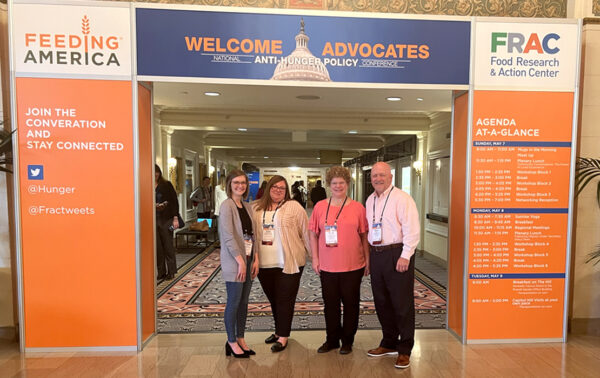
In addition to attending the conference, the group was also able to attended Capitol Hill Fly-in Day where they were able to directly engage with congressional offices on issues important to food security, ending hunger, and the Farm Bill.
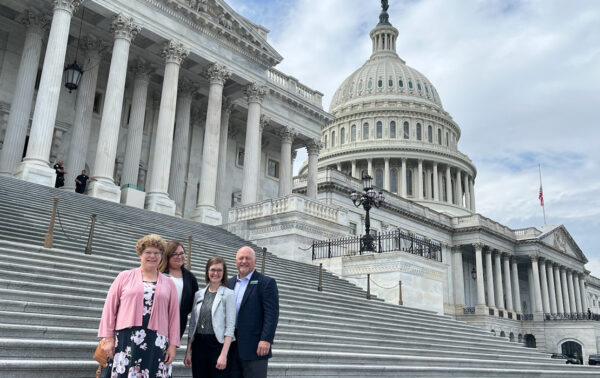
Other ways to make your voice heard
To make progress toward ending hunger in Nebraska and western Iowa, we need to make sure our lawmakers in Washington are fighting for those struggling here in the Heartland. Federal nutrition programs matter here at home. You can help make sure our representatives see how great the need is—call on Nebraska and Iowa lawmakers in Washington D.C. to make ending hunger a priority.
Advocate for a hunger-free America. Click here to learn more about federal nutrition programs and how you can lend your support.
2024 Legislative Agenda
Food Bank for the Heartland is a proud member of the Iowa Food Bank Association, which is comprised of six Feeding America food banks serving the state. The Iowa Food Bank Association has identified its top priorities for the 2024 Legislative session:
1. How SNAP Benefits Iowans
Educate lawmakers about how SNAP (Supplemental Nutrition Assistance Program) benefits farmers and those experiencing food insecurity across Iowa. Learn more.
2. Iowans Feeding Iowans Act
Secure funding for Iowa food banks to purchase local and Iowa-produced foods to feed our communities through $5 million to purchase Iowa-grown, produced or processed foods for distribution to Iowans in need. Food banks will provide matching funds. Learn more.
3. Double Up Food Bucks
Increase funding for Double Up Food Bucks, a program that helps Iowans with low incomes purchase fresh fruits and vegetables through SNAP. This includes a $1 million annual appropriation to support Double Up Food Bucks, administered by Iowa’s Healthiest State Initiative. Learn more.
Click here to learn more about The Iowa Food Bank Association’s policy priorities.
HF 3 AND SSB 1105 (now SSB 494) — IOWA
The Iowa Senate advanced their bill SSB 494 (previously SSB 1105) along a party-line vote on March 22, 2023.
SNAP provides a critical lifeline for Iowans. Proposals to restrict access to this resource—such as those included within this bill for Iowans create additional barriers to this important program.
According to Feeding America, 1 in 14 Iowans—including 1 in 9 children—is facing hunger.
As we learn more about the implications of this legislation we will share here.
Click here to read Brian Barks’ full op-ed from February 2023. Find and contact your Iowa state legislator here.
Thank you for your support!
Many issues impacting hunger relief can be remedied through state level actions—whether legislative or administrative measures. Contact your state legislator and encourage your representative to support Food Bank for the Heartland’s efforts to ensure neighbors who need food can access it. Find your Iowa state senator or representative today.
The current legislative session began in Lincoln on January 3, 2024, and will go through mid-late April 2024.
LB 952 – Nebraska Opts into Summer Program
On Monday, February 12th, Nebraska Gov. Jim Pillen changed his stance and opted into the federal Summer EBT Program to help an estimated 150,000 kids facing hunger in Nebraska. Food Bank for the Heartland is thrilled with this announcement as it will provide hope, and nutritious food to thousands of families for summers to come. To learn more about the Governor’s decision—and the positive impact it will have on our state—click here.
Food Bank CEOs testify in Lincoln
On Thursday, February 1, Food Bank for the Heartland President & CEO Brian Barks joined Food Bank of Lincoln’s President & CEO, Michaella Kumke and Nebraska State Senator Jen Day, to provide testimony and support for LB 952, which would force the state to accept $18M in federal food funds for children through the Summer EBT Program. Food Bank for the Heartland and Food Bank of Lincoln are grateful for Sen. Day for introducing this bill. Click here to read a joint op-ed from area food banks.
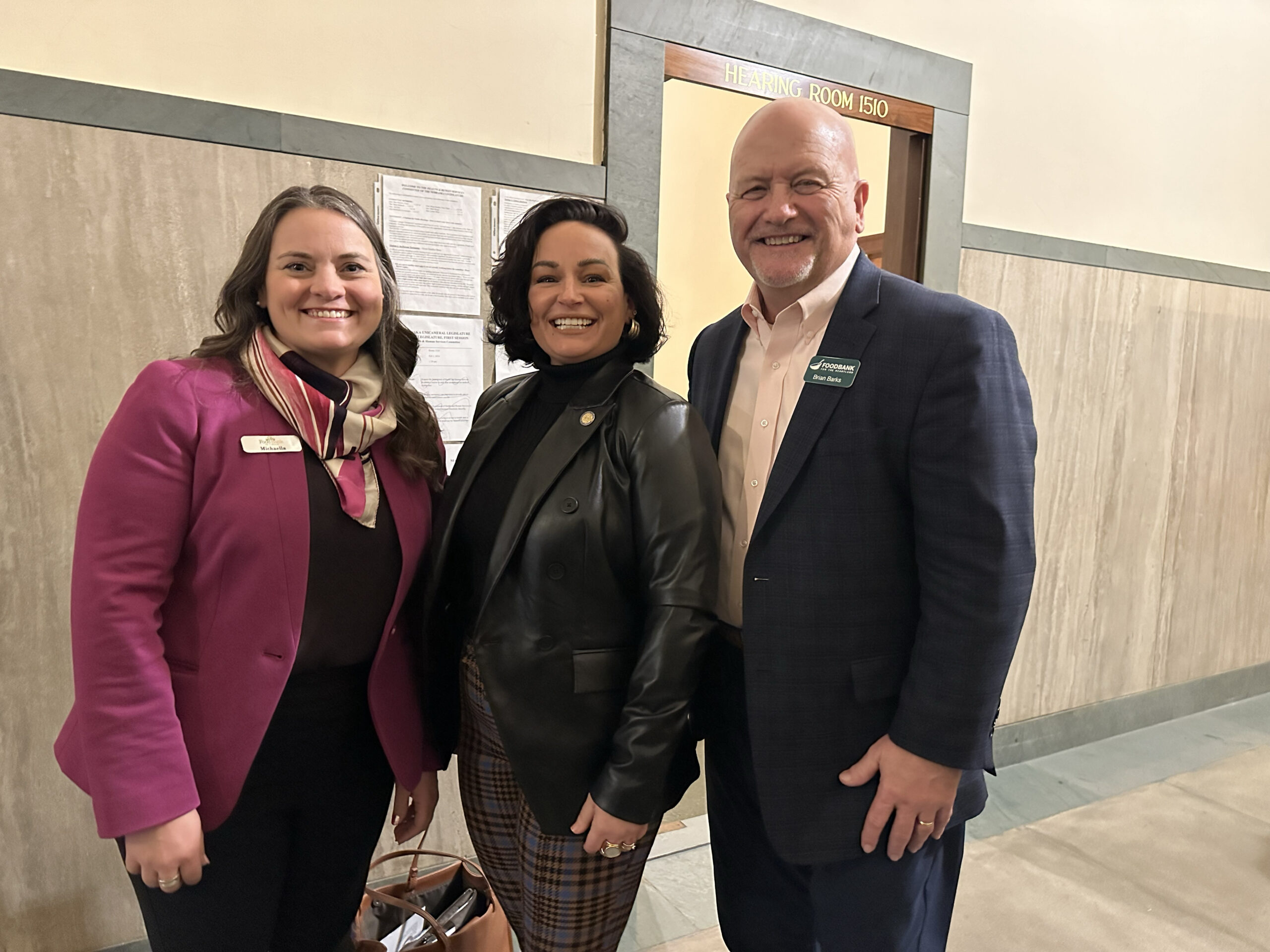
New bills this session:
SNAP BILLS
LB 882 (Introduced by Senator Eliot Bostar)
This bill would change provisions relating to benefits under the federal Supplemental Nutrition Assistance Program – would require the Department of Health and Human Services to pay for delivery fees with state funds for online ordering. The Health and Human Services Committee hearing is scheduled for 2/23/24.
LB 920 (Introduced by Senator Terrell McKinney)
This would require the Department of Health and Human Services to establish a Restaurant Meals Program – would allow SNAP recipients to redeem their benefits at private restaurants that contract with DHHS at concessional prices – targeting the elderly and disabled. The Health and Human Services Committee hearing is scheduled for 2/21/24.
LB 1381 (Introduced by Senator Ben Hansen)
This bill would provide work requirements for recipients of the Supplemental Nutrition Assistance Program, would eliminate waivers, and would mandate employment and training program participation for SNAP recipients. The Health and Human Services Committee hearing is scheduled for 2/14/24. Click here to read the Food Bank’s testimonial in opposition to this bill.
Income Tax Credits for Food donations
LB 1040 (Introduced by Senator John Fredrickson)
This bill would change provisions relating to income tax credits for food donations (funds up to $1 M in tax credits which were approved last session). The Revenue Committee hearing date is TBD.
Food Deserts
LB 1116 (Introduced by Senator Teresa Ibach)
Adopting The Grocer Reinvestment Option Act would create a grant or loan program for small, locally owned grocery stores in areas where residents travel a substantial distance to shop for groceries. Appropriates $2M. The Agriculture Committee hearing is scheduled for 1/30/24. Click here to read the Food Bank’s testimonial in support of this bill.
Bills held over from the 2023 session:
LB 88 SNAP — Reentry (Introduced by: Senator Megan Hunt)
This bill can help Nebraskans in some of their most vulnerable times. When someone has a conviction on their record it can greatly impact their ability to find work, housing, and other essential resources. Food is vital for self-support, sustainability, and successful integration into society. The limitations that currently exist around nutrition assistance for those with drug felonies are cumbersome and confusing for those with dated convictions while simultaneously denying a stable food source for those re-entering the community.
We encourage you to watch this video from our friends at Heart Ministry Center featuring Nebraskans sharing the harmful impact that the SNAP ban has had on their lives. Comment, like, and share this video—or tag your state senator or member of Congress to make sure they hear about this important issue!
The hearing date for LB 88 was Wednesday, March 15, 2023, before the Health and Human Services Committee. To date, the bill has not been voted out of committee.
We remain committed to working on legislation that will eliminate hunger across the Heartland by ensuring consistent access to healthy foods through community partnerships.
Thank you for your support!
Many issues impacting hunger relief can be remedied through state level actions—whether legislative or administrative measures. Contact your state legislator and encourage your representative to support Food Bank for the Heartland’s efforts to ensure neighbors who need food can access it. Find your Nebraska state senator today.
Local level
Local elected officials are oftentimes closest to the issues we face on a daily basis. Food insecurity is no different. Make your voice heard by connecting with your local officials at the county and city level.
Educate
You can play a vital role in educating the people around you and encouraging them to rethink some of their preconceived notions about food insecurity and the vital programs that are helping to feed people in your community.
How can you do this? Inform your friends, family, neighbors, and co-workers about the issues involved in food insecurity in your community, tell them about the importance of programs like SNAP, child nutrition and other programs, and show them the positive impact Food Bank for the Heartland’s efforts are having on your community. Utilize our advocacy resources to learn more and help spread the word.
How you can make your voice heard:
Farm Bill
The Farm Bill is the centerpiece federal legislation for food and farming, and it impacts access to nutritious food for the millions of people in America struggling with hunger—including our neighbors across Nebraska and western Iowa. It provides an opportunity for policymakers to comprehensively and periodically address agricultural and food issues. In addition to developing and enacting farm legislation, Congress is involved in overseeing its implementation. The Farm Bill typically is renewed about every five years.
Read more about the Farm Bill here. Learn how the Farm Bill is helping reduce hunger on Feeding America’s website. Feeding America continues to work to protect and strengthen key federal nutrition programs. Some of their priority issues in the bill include: the Supplemental Nutrition Assistance Program (SNAP), The Emergency Food Assistance Program (TEFAP), Commodity Supplemental Food Program (CSFP), and Food Rescue.
Food Bank for the Heartland staff joins Food Bank of Lincoln and Feeding America on the Hill
As the lame-duck session continues into December, staff members from Food Bank for the Heartland and Food Bank of Lincoln joined Feeding America lobbyists on the hill to discuss important issues in fighting food insecurity across our service area. Funding for programs like TEFAP and SNAP are top of mind, both in the waning days of this session as well as preparation for the new Congress to convene in January. Sharing data concerning the changing landscape of hunger and how federal programs impact everyday citizens in our service area provides context to our delegation members.

White House Conference on Hunger, Nutrition, and Health
On September 28, 2022, for the first time in over 50 years, the Biden-Harris Administration hosted a conference aimed at influencing the country’s food policies, including those affecting our neighbors in Nebraska and western Iowa. This aligns with the administration’s goal of ending hunger and reducing diet-related disease through the promotion of healthy eating and physical activity in the U.S. by 2030.
The conference featured five pillars:
- Improve food access and affordability
- Integrate nutrition and health
- Empower all consumers to make and have access to healthy choices
- Support activity for all
- Enhance nutrition and food security research
These pillars align with the Food Bank’s mission of eliminating hunger in the Heartland by ensuring consistent access to healthy foods through community partnerships.
Click here to learn more about the conference. View the Biden-Harris National Strategy on Hunger, Nutrition and Health here. Watch panel sessions for each of the five pillars of the National Strategy here.
In addition to the White House’s resources, USDA released “Leveraging the White House Conference to Promote and Elevate Nutrition Security: The Role of the USDA Food and Nutrition Service (FNS)” to highlight ways FNS is supporting—and will continue to support—the President’s goal and to leverage the momentum of the Conference.
Other ways to make your voice heard
To make progress toward ending hunger in Nebraska and western Iowa, we need to make sure our lawmakers in Washington are fighting for those struggling here in the Heartland. Federal nutrition programs matter here at home. You can help make sure our representatives see how great the need is—call on Nebraska and Iowa lawmakers in Washington D.C. to make ending hunger a priority.
Advocate for a hunger-free America. Click here to learn more about federal nutrition programs and how you can lend your support. Reach out to Congress today and stand up for families struggling with food insecurity. Click here to send a message to your local Congress representative to protect programs like SNAP, which helps millions of Americans.
American rescue plan act (arpa) update — Nebraska
Food Bank for the Heartland is beyond grateful to be awarded the first nine months allotment of ARPA funding intended for food banks. This award is a result of American Rescue Plan Act legislation passed by the Nebraska Legislature in April of 2022 and will allow us to better serve our Nebraska neighbors—who continue to navigate the rising costs of everyday essentials—through the purchase and distribution of nutritious food.
The Food Bank staff is working closely with DHHS to to receive and administer this much-needed funding.
LB 763 – Adopt the Emergency Food Assistance Act (INTRODUCER: SENATOR Wendy DeBoer) — NEBRASKA
This bill proposes $10 million in general fund appropriations each year of the biennium ($20M total) to DHHS to distribute to non-profit organizations that distribute food in 10 or more counties and qualifies for TEFAP by USDA. Eligible expenditures include purchase and distribution of food; infrastructure; food storage; equipment; and, construction for increased capacity.
The hearing date for LB 763 is Friday, March 24, 2023, at 1:30 p.m. before the Appropriations Committee. We encourage you to support this bill by submitting a comment on the Nebraska Legislature website here. The deadline to submit and verify a comment for the hearing record for LB 763 was Thursday, March 23, 2023 at 12:00 p.m. Otherwise, please reach out to your state senator and share your support for LB 763.
LB 661 SNAP – Innovation grants for non-profits fighting food insecurity (INTRODUCER: SENATOR Teresa Ibach) — NEBRASKA
This bill proposes $2.25 million in general fund appropriations to DHHS to distribute to non-profits focusing on programs or projects to fight food insecurity.
The hearing date for LB 661 was Wednesday, February 15, 2023 before the Health and Human Services Committee.
LB 84 SNAP – CLIFF EFFECT/GROSS ELIGIBILITY (INTRODUCER: SENATOR JEN DAY) — NEBRASKA
This bill can help Nebraskans continue to put food on the table as they advance in the workplace, effectively incentivizing Nebraska workers to continue to strive for self-sufficiency and providing a pathway out of government assistance. The cliff effect is considered among the greatest barriers to self-sufficiency for low-income families, as it results in pay raises being rejected, more hours being worked and fewer people pursuing educational opportunities that may also result in an increase in income.
The hearing date for LB 84 was Thursday, March 2, 2023 before the Health and Human Services Committee.
LB 88 SNAP – DRUG FELONY (INTRODUCER: SENATOR MEGAN HUNT) — NEBRASKA
This bill can help Nebraskans in some of their most vulnerable times. When someone has a conviction on their record it can greatly impact their ability to find work, housing, and other essential resources. Food is vital for self-support, sustainability, and successful integration into society. The limitations that currently exist around nutrition assistance for those with drug felonies are cumbersome and confusing for those with dated convictions while simultaneously denying a stable food source for those re-entering the community.
The hearing date for LB 88 was Wednesday, March 15, 2023 before the Health and Human Services Committee.
LB 524 SNAP – TAX CREDIT FOR DONATIONS OF FOOD (INTRODUCER: SENATOR JOHN FREDRICKSON) — NEBRASKA
This bill proposes a tax credit for businesses that donate food to pantries, food banks, and food rescue organizations.
The hearing date for LB 524 was Wednesday, March 22, 2023 before the Revenue Committee.
HF 3 AND SSB 1105 — IOWA
The Iowa Senate advanced their bill SSB 494 (was SSB 1105) along a party-line vote on March 22, 2023.
SNAP provides a critical lifeline for Iowans. Proposals to restrict access to this resource—such as those included within bills introduced by the Iowa House (HF 3) and Senate (SSB 1105)—will harm families, and undermine community, state, and national efforts to address food insecurity.
According to Feeding America, 1 in 14 Iowans—including 1 in 9 children—is facing hunger.
“We must protect SNAP and its ability to effectively fight hunger in every Iowa community.” — Brian Barks
Please reach out to your elected officials at the state level and ask them to oppose any legislation that attempts to cut SNAP assistance that is needed now, more than ever. Click here to read Brian Barks’ full op-ed from February 2023. Find and contact your Iowa state legislator here.
Thank you for your support!
Many issues impacting hunger relief can be remedied through state level actions—whether legislative or administrative measures. Contact your state legislator and encourage your representative to support Food Bank for the Heartland’s efforts to ensure those who need food can access it. Find your Nebraska state senator or Iowa state senator or representative today.
Local level
Local elected officials are oftentimes closest to the issues we face on a daily basis. Food insecurity is no different. Make your voice heard by connecting with your local officials at the county and city level.
Educate
You can play a vital role in educating the people around you and encouraging them to rethink some of their preconceived notions about food insecurity and the vital programs that are helping to feed people in your community.
How can you do this? Inform your friends, family, neighbors, and co-workers about the issues involved in food insecurity in your community, tell them about the importance of programs like SNAP, child nutrition and other programs, and show them the positive impact Food Bank for the Heartland’s efforts are having on your community. Utilize our advocacy resources to learn more and help spread the word.
Advocacy Resources
Take action today! Below are some great resources on hunger advocacy efforts.

Start a Virtual Funds Drive
Get your friends and family involved in the fight to end hunger. Set up your virtual funds drive today!
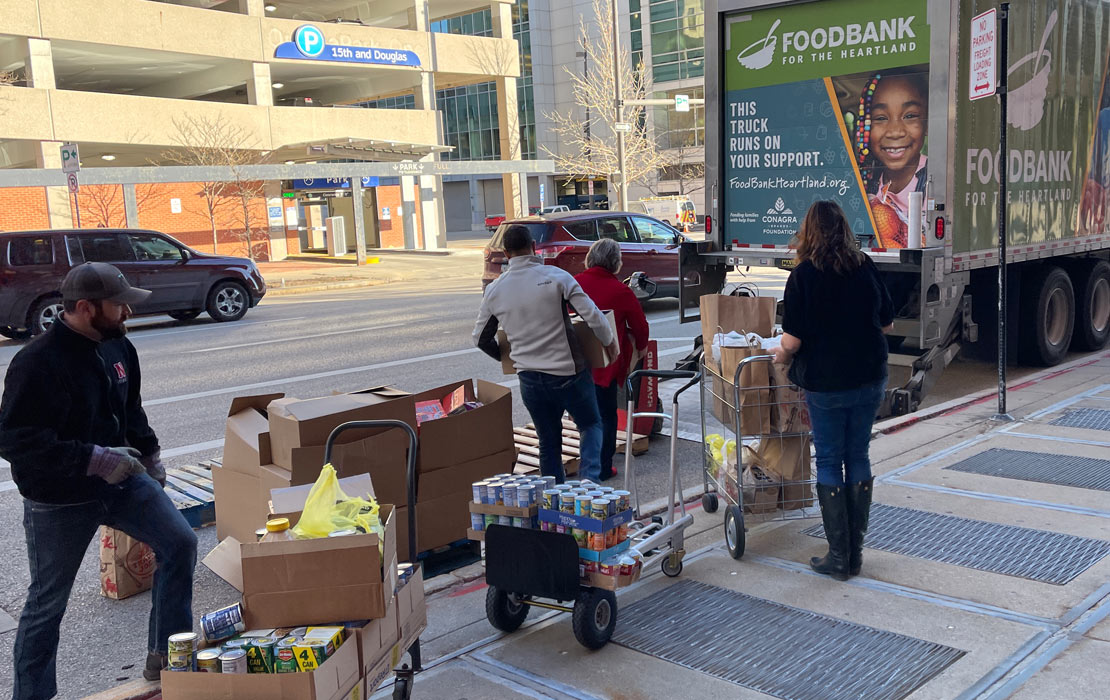
Host a Food Drive
Food drives are a great way to connect with co-workers and friends while helping our neighbors in need.




